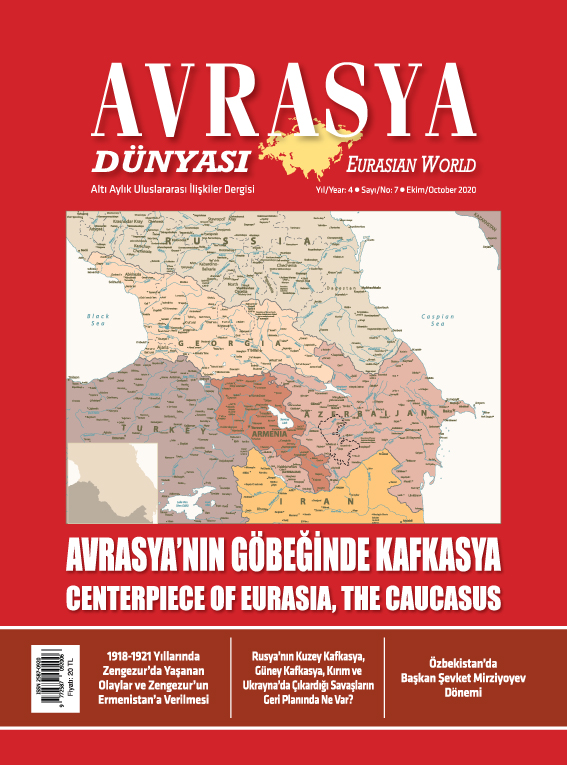Dear Readers,
Hello once again from AVİM. I should straightaway underline that our meeting this time coincides with a special occasion. With this issue, the third year of the Eurasian World is coming to a completion. Time flies. Three years have passed since the Eurasian World as a new international relations journal has begun to be published. We are happy and proud to share our joy with you. We express our gratitude for your interest and support. We hope our interaction will last many years.
In this issue we continue with our approach that we followed in our last two issues, which we believe met your appreciation. Following the method that aims to analyze the Eurasian region through its sub-regions, we would like to focus on the Caucasus following the Balkans and the Central Asia. We should first explain how we define the Caucasus. In our understanding the Caucasus signifies the region that lies to the south of the Caucasus mountain rage. Therefore, the North Caucasus that lies to the north of the said mountain range remains within the Russian Federation is out of the scope of our area of research. As such, our aim is to concentrate on the South Caucasus composed of Georgia, Azerbaijan, and Armenia. Naturally, we are aware that South Caucasus cannot be studied by overlooking the Caspian Sea in the east and the Black Sea in the west. Likewise, we are mindful that the relations between the three powerful actors of the region, namely, Turkey, Russian Federation and Iran as well as with the regional countries should be taken into consideration. All these facts and factors give the South Caucasus a dynamic rather than a static character. Accordingly, AVİM considers the region as the ‘hinge’ of the eastern and western wings of Eurasia. Hence, more than half of the articles in this issue focus on the issues and problems related to the Caucasus. By this way, we believe that we may contribute to the better understanding of this rather small but highly significant region. This is for your careful perusal.
Wishing you a good reading and thank you for your attention.
“Covid-19 Sürecinde Rusya Siyaseti: Etkiler ve Olası Sonuçlar,” Oğuzhan Mutluer
“Augmenting Russian and Chinese Interests in the Baltic Countries, Is it out of Friendship only? (II),” Kristijonas Medelis
“Does the EU Need a Grand Strategy to Become a Global Actor?” Jamila Zeynalzade
“Güney Kafkasya’da Bitmeyen Savaş: Dağlik Karabağ İhtilafi ve Yürü(tüle)meyen Barış Süreci,” Turgut Kerem Tuncel
“Armenia Has No Intention to Achieve Durable Peace and Security in the Region,” Elchin Allahverdiyev & Nigar Shiralizade
“1918-1921 Yıllarında Zengezur’da Yaşanan Olaylar ve Zengezur’un Ermenistan’a Verilmesi,” Ceyda Acicbe
“The David Gareja/ Keshikchi Dag Puzzle: Identity Question vs. Strategic Partnership in the South Caucasus,” Vahid Aliyev
“Karadeniz’i Elde Tutmak İçin: Rusya’nın Kuzey Kafkasya, Güney Kafkasya, Kırım ve Ukrayna’da Çıkardığı Savaşların geri planında Ne Var?” Fethi Kurtiy Şahin
“Soğuk Savaş Sonrası Dönemde Avrupa Birliği’nin Kafkasya Politikası,” Melih Demirtaş
“Güney Kafkasya’daki Etnik Çatışmalar, Ülke İçinde Yerlerinden Edilmiş Kişiler ve Uluslararası Müdahale Üzerine Bir Değerlendirme,” Hazar Ege Gürsoy
“Ahıska Türklerinin Anavatanlarına Geri Dönüş Sürecinde Avrupa Konseyi’nin Rolü,” Serhat Keskin
“Gürcistan’ın Avrupalılaşma Sürecinini Yeniden Düşünmek,” Yelda Karadağ
“Özbekistan’da Başkan Şevket Mirziyoyev Dönemi,” Pınar Köksal
“Sino-Russian Energy Relations: Assessing the Impact of Political and Economic Crises on Russia’s Energy Pivot to China,” Nemanja Popovic
Oğuzhan Mutluer (Research Assistant, International Relations Dept., Eskişehir Osmangazi University)
Kristijonas Medelis (Independent Researcher, Vilnius, Lithuania)
Jamila Zeynalzade (Master’s Student, Linköping University, Linkoping, Sweden)
Turgut Kerem Tuncel (Senior Analyst, Center for Eurasian Studies (AVİM))
Elchin Allahverdiyev (First Secretary (Political Affairs), The Embassy of the Republic of Azerbaijan to the Republic of Turkey)
Nigar Shiralizade (Senior Expert, The Embassy of the Republic of Azerbaijan to the Republic of Turkey)
Ceyda Acicbe (Analyst, Center for Eurasian Studies (AVİM))
Vahid Aliyev (Independent Researcher and External Collaborator, Center for Security Analyses and Prevention, Prague, Czech Republic)
Fethi Kurtiy Şahin (Research Assistant, Area Studies Doctorate Program, Middle East Technical University, Ankara)
Melih Demirtaş (PhD Candidate, Area Studies Doctorate Program, Middle East Technical University, Ankara)
Hazar Ege Gürsoy (Research Assistant, Eurasian Studies Graduate Program, Middle East Technical University, Ankara)
Serhat Keskin (Research Assistant, Sociology Dept., Middle East Technical University, Ankara)
Yelda Karadağ (Program Officer, International Republican Institute, Ankara)
Pınar Köksal (Prof. Dr., Political Science and Public Administration Dept., Middle East Technical University, Ankara)
Nemanja Popovic (Junior Analyst, Global Risk Insights, Belgrade, Serbia)


